| Srl | Item |
| 1 |
ID:
189846
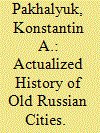

|
|
|
|
|
| Summary/Abstract |
In the regions of Central Russia, museum expositions actualize history
not only by putting it into the national context, but also by including
numerous references to the outside world. This is one of the mechanisms
by which representatives of local cultural elites, who are not directly related to the science and practice of international relations, provide guidelines
for the public understanding of world politics. Analysis based mainly on
field studies shows that the outside world simultaneously appears as both
something hostile and as a space of cooperation. “Russian antiquity” and
the Russian province are looking for conceptualization in international and
transnational perspectives, which are not always reduced to conflict.
|
|
|
|
|
|
|
|
|
|
|
|
|
|
|
|
| 2 |
ID:
189835


|
|
|
|
|
| Summary/Abstract |
T
he events of 2022—the beginning of Russia’s special military
operation in Ukraine and the subsequent economic war of the
“collective West” against Russia—have aroused speculations
that the St. Petersburg period of Russian history is over. According to
renowned political scientist Dmitry Trenin, “in fact, the point at issue
is the renunciation of part of Peter the Great’s legacy—three hundred
years of Russia positioning itself not only as a great European power
and an integral part of the balance of power on the continent, but also
as an integral part of pan-European civilization” (2022, p. 3). Russia is
secluding itself on an “island” and turning towards Asia.
|
|
|
|
|
|
|
|
|
|
|
|
|
|
|
|
| 3 |
ID:
189837


|
|
|
|
|
| Summary/Abstract |
If we look at major confrontations of the 1940s-1950s (the dispute
over Iran, tensions over West Berlin, or the Korean War), the Soviet
Union failed to achieve its goals in any of them. Nevertheless, at the
end of the first decade of the Cold War, the Soviet Union emerged as
a formidable opponent of the United States. Its rise was due to the
growing economic and military might, and this growth was in no way
hindered by occasional foreign policy setbacks.
|
|
|
|
|
|
|
|
|
|
|
|
|
|
|
|
| 4 |
ID:
189838
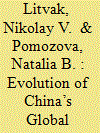

|
|
|
|
|
| Summary/Abstract |
China’s rapid economic development in recent decades has significantly
boosted its international political activities as evidenced by the promotion
of a set of relevant global foreign policy doctrines. Unlike the concepts
adopted under Mao Zedong and Deng Xiaoping, which were rather bombastic and ideological, China’s foreign policy conceptions adopted since the
early 2000s were based on a scientific approach. This article explores
the evolution of China’s key global foreign policy concepts, enshrined
in fundamental state and party documents, through the lens of Michel
Foucault’s methodology. Employing the “archaeology of knowledge,” we
show that the key concepts reflect China’s transformation into one of
the leaders in the system of international relations, and the genealogy
of discourse helps reveal the “reflective” nature of Chinese foreign policy
discourse in contrast to the “egoistic” American one. Having studied and
rethought the experience of the United States and Europe, China places
emphasis on universal development and prosperity, designating them as its
international policy goal.
|
|
|
|
|
|
|
|
|
|
|
|
|
|
|
|
| 5 |
ID:
189843
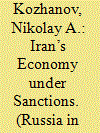

|
|
|
|
|
| Summary/Abstract |
Iran’s economy has lived under sanctions for the last forty years. Yet their
pressure has been uneven: the most sensitive measures were applied against
Iran by the U.S. and its partners in 2010–2015 and in 2018–2022. However,
despite gloomy expectations of grave consequences for Iran’s economy,
it has managed to survive: it has been damaged but not shattered. The
Iranian government has succeeded in securing control over the domestic
political situation. Even though Tehran has been unsuccessful in completely
offsetting the negative impact of the sanctions, it has mitigated their effect
in the short term and won time necessary for devising a long-term program
of anti-sanctions measures. This article analyzes the impact of sanctions on
Iran’s economy with a special focus placed on the factors that determined
their partial success/failure. The paper also analyzes the lessons Iran could
draw from its experience in resisting U.S. sanctions that may be helpful
in counterbalancing the short- and long-term impact of the current U.S.
pressure on the country’s economy.
|
|
|
|
|
|
|
|
|
|
|
|
|
|
|
|
| 6 |
ID:
189844


|
|
|
|
|
| Summary/Abstract |
The article presents arguments allowing the notion of security dilemma to
be extended to historical memory and competing narratives of the past.
In the international arena, securitization of historical narratives can lead
to a mnemonic security dilemma. Systematic challenging of the most
important historical narratives of state A by key mnemonic actors of state
B puts the political elites of state A before a choice: ignore this action
or develop a set of measures aimed at countering attempts to undermine
“their own” narrative and discredit historical narratives significant for the consolidation of society in state B. Under these conditions, the
incompatibility of narratives becomes an important and even constitutive
factor in the formation of macropolitical identity. The article considers
different options for the emergence of a mnemonic security dilemma during
conflicts between Serbia and Croatia, and between Russia and Ukraine. It
shows that a mnemonic security dilemma significantly complicates the
resolution of interstate conflicts.
|
|
|
|
|
|
|
|
|
|
|
|
|
|
|
|
| 7 |
ID:
189840


|
|
|
|
|
| Summary/Abstract |
T
he Ukraine conflict has created a new economic reality,
highlighting the critical importance of resources over
manufacturing, finance, and services. After the Russian troops
rolled across the Ukrainian border, the West imposed the harshest
sanctions any country had ever faced, both in terms of their number
and intended impact. It has long been recognized that economic
sanctions are a weak deterrent for governments resolutely pursuing
their policies. The current situation is more nuanced though. Together
with other dramatic events, above all, the COVID-19 pandemic,
Russia’s special operation in Ukraine has opened a unique window of
opportunity for resource-rich countries to influence the immediate
future of the world economy that currently hangs in balance.
|
|
|
|
|
|
|
|
|
|
|
|
|
|
|
|
| 8 |
ID:
189834


|
|
|
|
|
| Summary/Abstract |
The current year 2022 is seen today
as a turning point amid unexpected
radical events taking place
before our eyes. But in historical
retrospect, it will probably look like
a link in a smoother process—the
accumulation of global prerequisites
for change and their implementation.
Russia has once again set out as an
inciter of such change. It is not doing
this for the first time, especially if
one remembers the 20th century.
|
|
|
|
|
|
|
|
|
|
|
|
|
|
|
|
| 9 |
ID:
189836
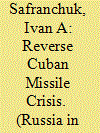

|
|
|
|
|
| Summary/Abstract |
This article conceptualizes the current crises around Ukraine and Taiwan
as “a reverse Cuban missile crisis.” The Cuban missile crisis was a turning
point in the history of the Cold War. The two superpowers found themselves
at the brink of mutual annihilation and turned to negotiations to prevent
it. Today the transformation of the world order and escalation of the great
power competition can culminate in a new crisis like the Cuban one, and
with a similar outcome. However, in contrast to the USSR which ultimately
recognized the United States’ red lines, today the U.S. does not recognize
Russia’s and China’s red lines, denying the very legitimacy of red lines as
such. The U.S. plans to retain its hegemony and seeks to achieve it with the
help of its regional allies. This strategy of “offshore balancing” has proven
to be quite useful for the U.S., which seems to ignore any discontent coming
from Russia and China.
|
|
|
|
|
|
|
|
|
|
|
|
|
|
|
|
| 10 |
ID:
189841
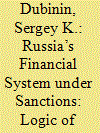

|
|
|
|
|
| Summary/Abstract |
External economic sanctions have created serious challenges to the stability
of Russia’s financial system. After the first emergency anti-crisis measures,
longer-term issues are coming to the fore. At this point, the main demand for
financial services is generated by the corporate sector. However companies
are seeing supply and value production chain disruptions. Uncertainty in
the business climate is fraught with systemic risks for both the budget and
the banking sectors of Russia. Overcoming them is a strategic goal of the
Russian government and the Central Bank. Both corporate and retail lending
risks have increased. The situation requires a reorganization of the financial
intermediaries in the bank loan and securities markets.
|
|
|
|
|
|
|
|
|
|
|
|
|
|
|
|
| 11 |
ID:
189842


|
|
|
|
|
| Summary/Abstract |
Russia’s special military operation in Ukraine has fueled an unprecedentedly
wide range of restrictions imposed by the Western states against Russia. The
sanctions hit all key sectors of the Russian economy, but does this mean
that they will work? This article’s key idea is that the imposed restrictions
are unlikely to be effective enough to let the countries that initiated them
attain their political goals. The sanctions have not changed Russia’s policy
towards Ukraine and there are no signs they ever will. At the same time,
they have proven to be relatively effective in terms of the damage inflicted
on the economy. Although the Russian economy has avoided an immediate
collapse and is adapting to the imposed restrictions, the sanctions my
affect the behavior of Russia’s foreign contractors.
|
|
|
|
|
|
|
|
|
|
|
|
|
|
|
|
| 12 |
ID:
189839


|
|
|
|
|
| Summary/Abstract |
“We have warned that such wording would not work!”—the 9th (2015)
and 10th (2022) NPT Review Conferences ended with the same message
from the United States and Russia. Last time the U.S. accused Moscow,
persuaded by Middle Eastern countries, of supporting the deadline
for organizing a conference on the creation of a Weapons of Mass
Destruction-Free Zone in the Middle East. In response, the Russian
delegation blamed the Americans for shielding Israel that sought
to thwart progress on this issue.
|
|
|
|
|
|
|
|
|
|
|
|
|
|
|
|
| 13 |
ID:
189845
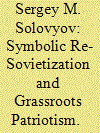

|
|
|
|
|
| Summary/Abstract |
This article is an attempt to explain the reasons for the restoration of
Soviet symbols in those regions of Ukraine that have come under Russian
control as a result of the current conflict, using the concepts of ‘crisis
of representation’ and ‘grassroots patriotism.’ It stresses that what is
happening cannot be explained as “the restoration of Soviet totalitarianism”
with support from the Russian authorities, who take a different position
towards the Soviet past. It is also shown that the appeal to Soviet values
is an obvious consequence of the trauma of the 1990s, experienced by the
entire post-Soviet space, that has not been overcome in mass mentality and
the ideological domain.
|
|
|
|
|
|
|
|
|
|
|
|
|
|
|
|